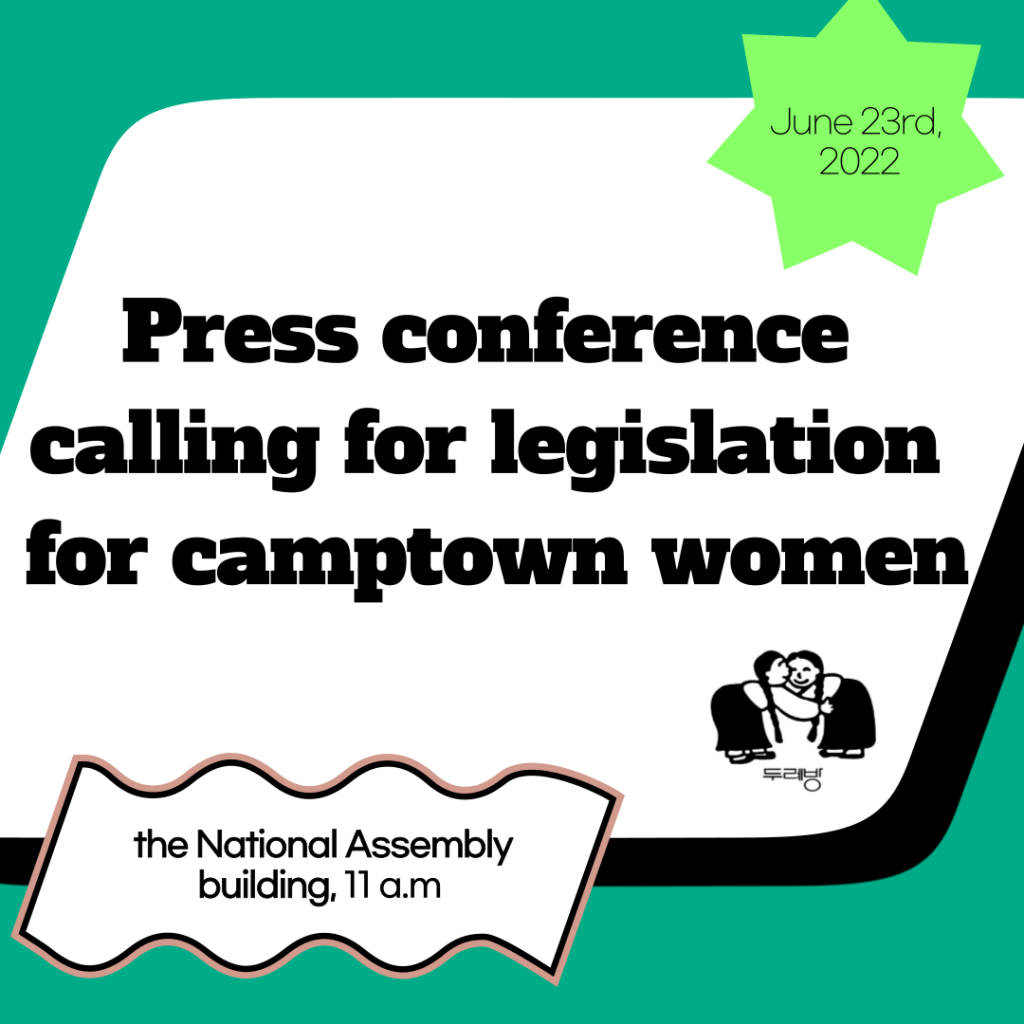Ongoing 8-Year Compensation Lawsuit for Camptown Women,
Looking Forward to a Fair Ruling
<Press conference calling for legislation for camptown women>
“Deferred justice is not justice.”
A press conference was held in front of the National Assembly building at 11 a.m. on June 23 to urge legislation for camptown women. Present were Durebang Counseling Center, Durebang Shelter, Center Poom, Sunlit Sisters’ Center, Professor Lee Na-young (Chairman Chung Eui-yeon, sociology professor at Chung-Ang University), Assemblyman Chung Chun-sook, and Representative Oh Young-mi (co-director of Gyeonggi Women’s Solidarity).
At the press conference, the Camptown Women’s Human Rights Coalition gave a statement calling for the Supreme Court to provide a swift and fair ruling on the ongoing 8-year compensation lawsuit for the U.S. Military Camptown Comfort Women.
Eight years ago, the verdicts of two trials recognized the state’s responsibility after 122 U.S. Military Camptown Comfort Women survivors filed a lawsuit against the state for damages and compensation.
On June 25, 2014, the “U.S. Military Camptown Comfort Women National Compensation Suit” was launched against the state. On January 20, 2017, the first trial officially acknowledged the state’s violence and human rights violations. In addition, in 2018, the appellate court ruled that the state actively operated and managed the camptown villages by providing “patriotic education” and “systemic and violent venereal disease management through illegal procedures.” In recognition of violating personal rights and human dignity, the state paid damages to all Plaintiffs.
However, eight years after the lawsuit began, the Supreme Court still has not made a final ruling. During this time, several of the 122 plaintiffs have passed away, with three passing away in the past three months, reducing the number of plaintiffs to a total of 111. In June 2019, a petition was filed by the plaintiffs and organizations to request an early Supreme Court ruling to “put an end to the past lawsuit,” and for the same purpose, official letters were filed to the Supreme Court twice in November 2020 and April 2021. But so far, the Supreme Court has yet to issue a final ruling.
As the Supreme Court’s ruling is delayed, discussions on political legislation to rescue survivors are also stalled. A bill to identify the size of the U.S. Military Camptown Comfort Women and to provide support was proposed at the 19th and 20th National Assembly but was scrapped at the end of the National Assembly’s term. While in the 21st National Assembly, a bill on fact-finding and victim support for the U.S. Military Camptown Comfort Women, proposed by Chung Chun-sook of the Democratic Party of Korea, was submitted to the standing committee of the Women’s and Family Committee, the ruling and opposition parties have not reached an agreement. In 2020, the Gyeonggi Provincial Assembly passed an ordinance to support women in camptown villages. However, without a superior law or Supreme Court ruling, there are no procedures or public agencies such as the Trust and Reconciliation Commission to investigate and assess damages for victims.
At the press conference in front of the National Assembly building, plaintiffs and the Camptown Women’s Human Rights Coalition urged the Supreme Court for a fair ruling and to enact the National Assembly’s special law as soon as possible.
Lawyer A, who co-represents the plaintiffs, said as follows.
“The Seoul High Court ruled that the state’s actions of establishing zones, gathering women to educate them, forming camptowns with the justification of prostitution, and imprisoning women in prison camps without legal grounds were illegal. As the facts have been confirmed to some extent, I hope the National Assembly will begin compensation for damages through legislation as soon as possible, regardless of the Supreme Court’s ruling.”
Eight years after the lawsuit began, several of the 122 plaintiffs have passed away, and in the past three months, three have passed, reducing the total number of plaintiffs to 111.
Deferred justice is not justice. Many survivors of the U.S. Military Camptown Comfort Women living in this state of a militarized and divided Korea hope for justice as soon as possible.
- “National Security Starts with Guaranteeing Women’s Human Rights”
- “Guarantee the Human Rights of the U.S. Military Camptown Comfort Women”
- “Supreme Court, Make a Decision”


